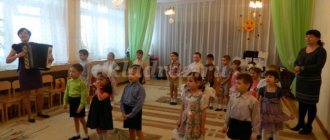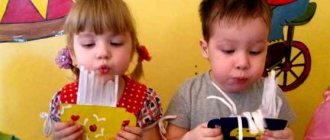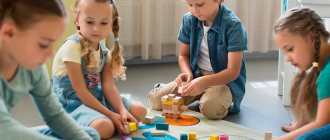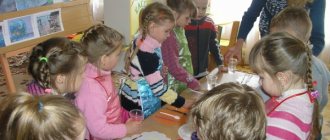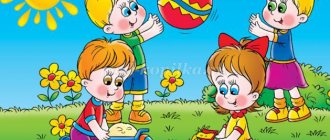A series of classes on listening to music in the senior group on the theme of P.I. Tchaikovsky "Waltz of the Flowers". Lesson 1.
Summary of a lesson on listening to music in the senior group
P.I. Tchaikovsky "Waltz of the Flowers"
Lesson 1.
Subject:
P. I. Tchaikovsky “Waltz of the Flowers” (initial and repeated listening to music).
Program content:
Educational objectives:
— continue to introduce children to the music of Russian composers (Pyotr Ilyich Tchaikovsky);
— learn to tune in to the perception of music while listening.
Developmental tasks:
- develop creative imagination through listening to music.
Educational tasks:
— to cultivate in children an interest in music and a desire to listen to it;
— develop cultural listening skills;
— to teach children to respond emotionally to music.
Preliminary work:
observing flowers and trees on the site, reading poems about flowers, looking at postcards, photographs depicting garden and wildflowers, drawing spring flowers; acquaintance with Russian folk crafts, the basis of which ornaments are motifs of various colors; listening to the music of P.I. Tchaikovsky “Snowdrop”, “Lilac Fairy”.
Equipment:
music center, disc P.I. Tchaikovsky “The Seasons”, portrait of P.I. Tchaikovsky, color photographs and postcards with spring, garden and wildflowers, pencils, sheets of white paper, dance paraphernalia (gymnastic ribbons, flowers).
Methods and techniques:
verbal
(
conversation), visual (demonstration of a portrait of the composer, color photographs and postcards with flowers, illustrations for the dance “Waltz of the Flowers” from the ballet “The Nutcracker”), practical (drawing based on a performance, dance).
Duration:
30 minutes.
Progress:
- Introductory part.
Educator: Guys, tell me what time of year it is?
Children: Spring.
Educator: That's right, guys! What happens to nature and plants in spring?
Children: nature awakens, the first flowers appear, buds bloom on the trees, fruit trees (plum, cherry, apricot, cherry, almond) bloom.
Educator: What were the first flowers you saw on our site?
Children: Yes! Primroses. And also green grass, buds on trees and flowers on tree branches.
- Main part.
Educator: Guys, today we will listen to a fragment of Pyotr Ilyich Tchaikovsky’s “Waltz of the Flowers”. Pyotr Ilyich Tchaikovsky is a great Russian composer who created many works of classical music, including various operas and ballet performances.
Demonstration of a portrait of the composer.
We have talked a lot about the fact that ballet is a large work consisting of different dances. “Waltz of the Flowers,” which we will now listen to, is an excerpt from the ballet performance “The Nutcracker.” There is also a lot of dancing in the Nutcracker ballet. We have already covered what a waltz is. That's right, this dance is light, whirling, paired. Like all waltzes, it sounds tender, swirling in flowers. Look at the illustrations: what beautiful and expressive poses the dancers have, soft expressive hands!
Display of illustrations for the dance “Waltz of the Flowers” from the ballet “The Nutcracker”.
When you listen to this music, try to imagine this dance of flowers - a waltz. What flowers will you see?
Display of color photographs and postcards with flowers.
How do flowers dance? How do they look? What are they doing? Or it won't be flowers. What then? While listening to music, pay attention to what you feel, what you imagine? What's your mood? And after listening to the music, we will share our impressions with you!
An excerpt (2-4 minutes) from the work “Waltz of the Flowers” is played.
Educator: Guys, what is the name of the piece you just listened to?
- "Waltz of the Flowers".
- Right. Who is the author of this work?
- Peter Ilyich Tchaikovsky.
Educator: That's right, well done!
This waltz has a big introduction. What musical instrument is the main one in this passage? This is a harp. Why do you think the composer chose this particular musical instrument for the Waltz of the Flowers? What musical instruments would you choose for this dance? What is the character of the music? What's your mood?
Children's answers. The teacher asks those who do not answer questions together with everyone else separately.
Educator: Guys, now let's sit down at the tables. Let each of you remember the music that we listened to today, and try to draw what you imagined while listening to the work of P.I. Tchaikovsky "Waltz of the Flowers".
Children draw. Children's drawings are hung on the board.
Educator:
In his musical work P.I. Tchaikovsky depicted a fairy-tale meadow with dancing flowers. Let's also spin with the fairy tale heroes in a magical waltz of flowers.
Children choose their own attributes (gymnastic ribbons, flowers) and dance freely to the music of the “Waltz of the Flowers.”
3. Final part.
Educator: Children, how beautifully you danced! But our lesson has come to an end. Tell me, what did you do today?
Children: Listened to music, looked at pictures, drew, danced to the music.
Educator: Did you like the lesson and what did you like most? Today we fantasized to the music of P.I. Tchaikovsky "Waltz of the Flowers". Let's look at your drawings, how beautiful they turned out! What different flowers did you imagine! What works do you like best and why?
Children's answers:
Kolomytseva Nastya:
I liked dancing to music and drawing. I drew flower fairies. They are light, airy, they fly from flower to flower and the result is a dance.
Lipartia George:
I liked the music we listened to today. I liked drawing. I have flowers in my drawing: roses, tulips. They are dancing.
Petrosyan Marat:
I drew a clearing with flowers.
Educator:
Let's think about how and what can be decorated with such beautiful drawings (a playroom, a bedroom in a kindergarten, your room at home)?
Images of spring flowers.
Illustrations. Dance "Waltz of the Flowers" from the ballet "The Nutcracker".
Self-analysis of music listening in the senior group
Both activities were focused on listening to music. During the classes, the following tasks were solved: to introduce children to the music of Russian composers, to teach them to tune in to the perception of music while listening, to listen carefully, memorize and recognize music; develop creative imagination through listening to music and musical-rhythmic movements; to cultivate in children an interest in music and a desire to listen to it, etc.
What was done well
: The guys listened to the music carefully. We remembered the composer and named him correctly in the second lesson. They knew the difference between the waltz and other types of dances, and were able to characterize the music of the waltz - gentle, light, whirling. The children enjoyed imagining and drawing after listening to the music. Most of the children drew flowers. We twirled in the waltz-improvisation with great pleasure, especially the girls, and played a musical game. Some boys were more restrained in expressing emotions and movements. Listening to music and playing games evoked positive emotions and pleasure in children. The use of gaming techniques during work helped prevent children from being overloaded and activated their attention and interest.
Difficulties:
It was difficult for the children to identify by ear the musical instruments sounding in the waltz. It was difficult for me to convey information about the composer and music to the children correctly and in an accessible form. The music worker helped me a lot with this. It was quite difficult to simultaneously hold the attention of the children, provide them with information, prepare attributes and equipment for listening to music and viewing slides, and maintaining discipline in the group. Thanks to joint efforts with the teacher and music worker, both classes were conducted at a fairly high level. According to the children's feedback, they liked both activities.
